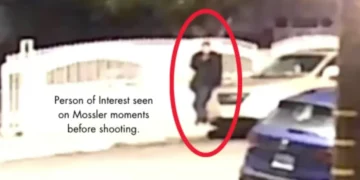NEW YORK, NY – Daniel Penny, a 26-year-old Marine Corps veteran, was acquitted Friday of criminally negligent homicide in the chokehold death of Jordan Neely, a 30-year-old man experiencing homelessness. The case, which ignited nationwide debates on vigilantism, public safety, and mental health care, centered on the deadly subway confrontation in May 2023.
The jury reached its decision after more than 20 hours of deliberation. Earlier in the day, the judge dismissed a more severe charge of second-degree manslaughter after jurors indicated they could not reach a unanimous verdict. The remaining charge of criminally negligent homicide required prosecutors to prove that Penny acted negligently and without justification when he restrained Neely in a chokehold for several minutes, leading to his death.
Penny, who had pleaded not guilty, showed visible relief as the verdict was read. His legal team embraced and celebrated the outcome. “We couldn’t be more pleased that a jury of Danny’s peers acquitted him of any wrongdoing,” Penny’s lawyers said in a statement. “This decision reaffirms that New Yorkers can step in to protect one another without fear of losing their freedoms or being unjustly punished.”
Incident on the F Train
The incident occurred on May 1, 2023, aboard an F train in Manhattan. Witnesses testified that Neely boarded the train and began shouting, throwing items, and making threatening remarks. While he was unarmed, passengers described feeling intimidated by his erratic behavior.
Penny, who was also a passenger on the train, approached Neely from behind and placed him in a chokehold in an attempt to subdue him. According to video footage, Penny held Neely in the chokehold for several minutes as bystanders looked on. Neely eventually lost consciousness.
When police arrived, officers attempted to revive Neely using CPR, Narcan, and an automated external defibrillator, but he was pronounced dead at the scene. The city medical examiner ruled Neely’s death a homicide caused by compression of the neck.
Neely’s Background
Jordan Neely was a former street performer known for impersonating Michael Jackson in New York City. He had experienced years of homelessness and mental illness following the murder of his mother in 2007. Advocates described Neely’s death as a tragic consequence of the city’s failure to provide adequate mental health care for vulnerable individuals.
The incident also spotlighted broader concerns about public safety on the city’s subway system. Neely’s death sparked widespread protests and demands for accountability, with his family and supporters calling for Penny’s arrest.
Trial and Defense Strategy
The trial, which began on November 1, 2024, featured testimony from more than 30 witnesses, including passengers, police officers, and medical experts. Prosecutors argued that while Penny may have had good intentions, his actions were reckless and excessive, leading to Neely’s death.
Defense attorneys countered that Penny was acting to protect other passengers, describing Neely’s behavior as unpredictable and threatening. They argued that Penny had no alternative means to deescalate the situation and maintained that his actions were justified.
Key witnesses included Penny’s Marine Corps martial arts instructor, who testified about the use of chokeholds, and a forensic pathologist who disputed the medical examiner’s determination that Neely’s death was caused by asphyxiation.
Jury Deliberations
The jury of 12, composed of seven women and five men, deliberated for four days. They reviewed video footage of the incident, police bodycam recordings, and Penny’s interview with authorities. They also requested readbacks of witness testimony, including cross-examinations of the medical examiner.
On Friday morning, jurors informed the judge that they could not reach a unanimous verdict on the manslaughter charge. The judge subsequently dismissed that count, leaving only the criminally negligent homicide charge for consideration.
The jury ultimately acquitted Penny of all charges, ending one of the city’s most closely watched trials.
Courtroom and Public Reactions
The verdict drew a mixed response in the courtroom. Penny’s supporters cheered, while Neely’s father, Andre Zachery, shouted in anger and was escorted out. Outside the courthouse, demonstrators chanted “Justice for Jordan Neely” and denounced the jury’s decision.
“The system is rigged,” Zachery said after the verdict. “My son didn’t have to go through this. I didn’t have to go through this either. It hurts. It really, really hurts.”
Neely family attorney Donte Mills urged the public to focus on supporting vulnerable individuals. “If we see someone asking for food, we have to take the responsibility to give it to them,” Mills said. “If we see someone cold, give them a coat. That’s how we help each other, because we can’t rely on the system to do it for us.”
Prominent activists, including the Rev. Al Sharpton and Eric Garner’s mother, Gwen Carr, condemned the verdict. Sharpton called it “the blatant legalization of civilian vigilantism,” while Carr urged Neely’s family not to give up their fight for justice.
The verdict also drew sharp criticism of Manhattan District Attorney Alvin Bragg, who had brought the charges against Penny. Some conservative figures praised Penny’s acquittal, while others, including Black Lives Matter activists, expressed outrage over what they saw as a failure of the justice system.
Bragg defended the prosecution, stating, “The jury carefully deliberated and reached its decision. While we respect their verdict, we remain committed to holding individuals accountable when their actions lead to tragic outcomes.”
The case has raised questions about the balance between public safety and individual accountability, particularly in situations involving mental health crises. Mayor Eric Adams addressed concerns about the implications of the verdict, stating, “There’s a desire among New Yorkers to help those in need, but we must also ensure that our actions do not cause harm.”
Adams emphasized the importance of addressing homelessness and mental health on the city’s subways, which have become a flashpoint for broader debates about public safety and social services.
As Penny walks free, the trial’s outcome leaves a lasting mark on New York City’s legal and social landscape, underscoring the complexities of justice in a deeply polarized society.


























